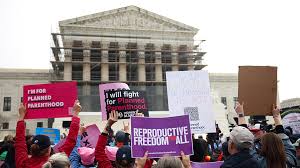The recent Supreme Court decision on the case of Medina v. Planned Parenthood South Atlantic has sparked intense debates on healthcare choices, federal funding, and reproductive rights. In a 6-3 ruling split along ideological lines, the Court sided with South Carolina, allowing the state to block Medicaid funding for Planned Parenthood clinics. This ruling has far-reaching implications for access to healthcare services and the ability of individual Medicaid patients to sue for their right to choose their healthcare provider.
The case revolved around whether low-income Medicaid patients have the legal standing to sue in order to select their own qualified healthcare provider. At the core of the dispute was South Carolina's decision to block Medicaid funding for Planned Parenthood South Atlantic, prompting a legal battle over federal law and individual rights. The Supreme Court's decision underscored the complex interplay between federal and state responsibilities in administering Medicaid funds through private healthcare providers.
Justice Neil Gorsuch, in authoring the opinion, emphasized that the redress for such violations typically involves the withholding of Medicaid funds by the Secretary of Health and Human Services from the state, rather than enabling individual lawsuits against the state. The dissenting liberal justices, led by Justice Ketanji Brown Jackson, criticized the majority's interpretation as a narrow reading of Section 1983 and a potential erosion of individual rights under federal law.
The legal battle reflected larger political divides over abortion rights and access to healthcare. Planned Parenthood, a frequent target for conservative critics due to its provision of abortion services, argued that the case was about general healthcare access, not just abortion services. The ruling has generated concerns about the impact on reproductive health services, including contraception, cancer screenings, and pregnancy testing, provided by Planned Parenthood clinics to low-income patients in South Carolina.
The decision comes amidst ongoing efforts by some GOP-led states to restrict funding to Planned Parenthood and curtail its involvement in Medicaid programs. Advocates on both sides of the abortion debate are closely watching these developments as they signal broader shifts in healthcare policy and access to reproductive services. The intersection of legal, political, and ethical considerations underscores the complexity of the issues at stake.
The ruling could have ripple effects on healthcare nationwide, as other states may seek to follow South Carolina's lead in limiting Medicaid funding to certain providers. Planned Parenthood, a major healthcare provider for low-income individuals, faces challenges in ensuring continued access to critical services if funding is curtailed. The broader implications of the decision raise questions about the balance between individual rights, state administrations, and federal healthcare regulations.
In the wake of the Supreme Court ruling, advocates and stakeholders are closely monitoring the fallout and potential repercussions for healthcare access, particularly for marginalized communities reliant on Medicaid services. The legal battle over Medicaid funding for Planned Parenthood underscores the ongoing debates surrounding reproductive rights, healthcare funding, and the role of the state in regulating healthcare providers. As the legal landscape continues to evolve, the impact of these decisions on public health and individual rights remains a subject of contentious debate and ongoing scrutiny.

